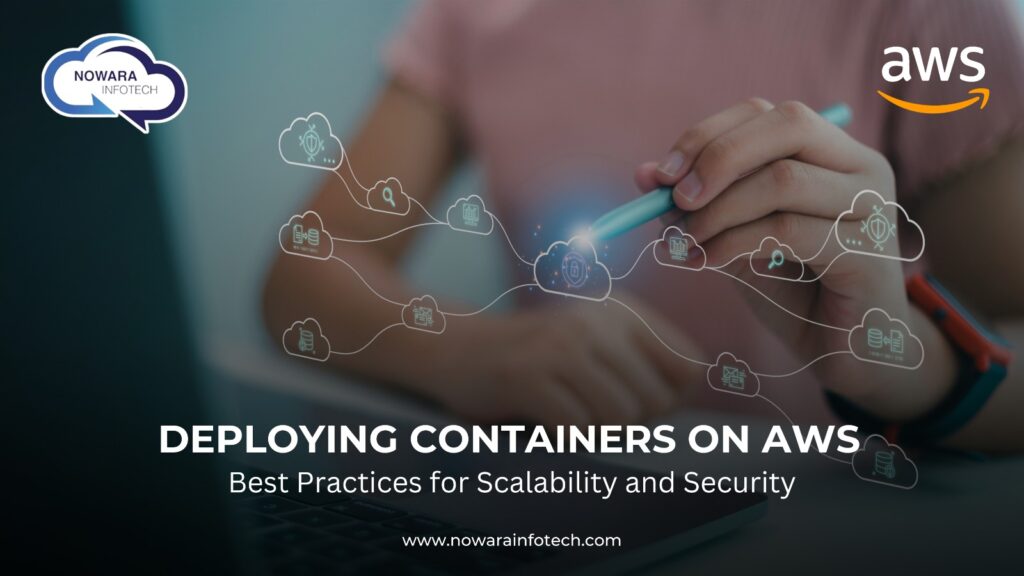As businesses scale, the need to efficiently deploy, manage, and secure applications grows. Containers have become the go-to solution for running applications, thanks to their portability, consistency, and lightweight nature. For organizations aiming to make the most out of their containerized workloads, AWS cloud services offer scalable, secure, and managed solutions to simplify deployment.
In this blog, we will explore the best practices for deploying containers on AWS, focusing on scalability and security while highlighting how AWS cloud services streamline the container journey.
Which AWS Service Should You Use for Running Container Applications?
AWS provides multiple services for running containerized applications, tailored to different needs.
Amazon ECS (Elastic Container Service):
A fully managed service that makes it easy to deploy and manage containers. It integrates seamlessly with other AWS hosting services and is ideal for teams looking for simplicity and tight AWS integration.
Amazon EKS (Elastic Kubernetes Service):
If you prefer Kubernetes for orchestration, EKS is the right choice. It simplifies Kubernetes deployment and management, ensuring scalability and high availability with minimal operational overhead.
Both ECS and EKS allow you to deploy, manage, and scale containers efficiently, making AWS a leading cloud services provider for containerized workloads.
Which AWS Service Simplifies Kubernetes Management?
For businesses using Kubernetes, Amazon EKS is the optimal solution. EKS provides a fully managed Kubernetes environment, allowing you to focus on application development while AWS handles the complexity of cluster management, scaling, and monitoring.
EKS integrates with other AWS web services like VPC, IAM, and CloudWatch, ensuring smooth deployment and monitoring. It automates patching, upgrades, and backup, helping businesses scale without interruptions.
Which AWS Service Offers Security Guidance?
AWS takes security seriously, providing tools and services to ensure compliance and protect your workloads. For container security, AWS Security Hub offers centralized insights and best practices for securing containerized applications.
AWS Security Hub integrates with Amazon GuardDuty and IAM (Identity and Access Management) to monitor and control access, while AWS Trusted Advisor provides recommendations for improving the security and performance of your deployments.
Best Practices for Deploying Containers on AWS
Implementing containers effectively on AWS requires a thoughtful approach to scalability and security. Below are key best practices to ensure smooth deployment.
1. Use Elastic Scaling for High Availability
Leverage Auto Scaling Groups to ensure that your container applications scale automatically based on demand.
Use AWS Fargate (a serverless compute engine) with ECS or EKS to remove infrastructure management overhead and scale on demand.
2. Optimize Resource Management
Use EC2 Spot Instances to reduce costs while running non-critical workloads.
Configure task placement strategies in ECS to ensure efficient use of resources across clusters.
3. Implement Security Best Practices
Use IAM roles and policies to manage access control for containers, ensuring that only authorized users and services can interact with your applications.
Encrypt sensitive data in transit and at rest using AWS KMS (Key Management Service).
Regularly monitor your container environment with Amazon CloudWatch to detect anomalies early.
4. Monitor and Manage Logs Effectively
Centralize logging with Amazon CloudWatch Logs or integrate with third-party tools for real-time monitoring.
Use log metrics to trigger alerts for any suspicious activity, ensuring rapid incident response.
5. Automate Deployment and Updates
Use AWS CodePipeline to automate the CI/CD process for seamless container updates.
Leverage Blue/Green Deployments to minimize downtime during updates and rollbacks.
AWS Container Security Best Practices
Securing your containers is critical to maintaining trust and minimizing risks. Below are essential security measures for container deployments on AWS:
Network Security:
Use Amazon VPC to isolate containers in private networks and control traffic with security groups and network ACLs.
Image Security:
Use Amazon ECR (Elastic Container Registry) to store and scan container images for vulnerabilities before deployment.
Role-Based Access Control (RBAC):
With IAM and Kubernetes RBAC policies, you can control who can access your container environment and perform specific tasks.
Compliance Monitoring:
Use AWS Security Hub and GuardDuty to monitor compliance with industry standards and detect potential security threats.
Why Choose AWS for Containerized Workloads?
AWS offers a robust suite of services to run, manage, and secure container applications, making it an ideal choice for businesses seeking scalable, secure solutions. As a trusted AWS professional services provider, we help enterprises seamlessly deploy containers on AWS, optimize resources, and secure their workloads.
- Scalability: Automatically scale resources based on demand with ECS, EKS, or Fargate.
- Security: Use built-in security tools to monitor and safeguard applications.
- Efficiency: Reduce operational overhead with serverless computing and automated management.
Partner with Nowara Infotech For The Trusted AWS Services Provider
Deploying containers on AWS enables businesses to achieve greater flexibility, scalability, and security. Whether you need a simple ECS deployment or advanced Kubernetes orchestration with EKS, AWS offers the tools to support your container strategy.
At Nowara Infotech, we specialize in AWS cloud services and container deployment solutions, helping businesses unlock the full potential of AWS hosting services. As your AWS professional services provider, we ensure your containerized applications run efficiently, securely, and at scale.
Looking to deploy containers on AWS?
Contact Nowara Infotech today to explore our AWS consulting services and take your container strategy to the next level!

